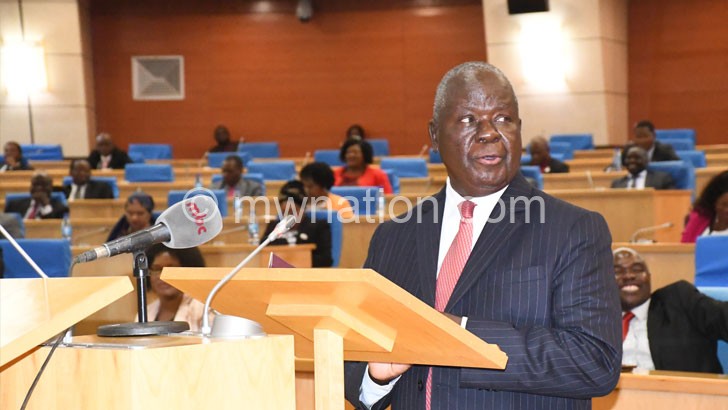Budget of promises
The newly-ushered Tonse Alliance administration yesterday presented a K722.4 billion provisional four-month budget which has made a serious attempt to meet its campaign promises.
In his maiden appearance in Parliament in Lilongwe, new Minister of Finance Felix Mlusu unveiled what he dubbed the Affordable Inputs Programme (AIP), an apparent departure from the promised universal subsidy programme. This triggered discomfort among opposition members of Parliament (MPs) who felt duped.
Essentially, the scheme is targeting 3.5 million farming households that will access fertiliser at K4 495/50kg bag.

The arrangement leaves out about 700 000 farming households to fend for themselves in an environment where the new regime has inherited a tough economic environment characterised by a myriad of economic hardships.
Ministry of Agriculture and Food Security estimates indicate that there are 4.2 million farming households.
Presenting the provisional budget in Parliament amid a hostile atmosphere manifested by regular interjections due to regular jeers from the opposition, Mlusu braved all odds to announce a proposed increase in minimum wage from K35 000 to K50 000, but this is conditional.
He said: “Government will engage Malawi Congress of Trade Union [MCTU] and Employers Consultative Association of Malawi [Ecam] to review the minimum wage from the current rate of K35 000 per month to a proposed K50 000 per month.”
The minister said the Labour Act is clear that the minimum wage will be determined through consultations with employers and workers.
MCTU secretary general Dennis Kalekeni yesterday welcomed the proposed increase in the minimum wage and said the planned consultation symbolised the new government’s adherence to the rule of law.
He said: “We are jubilating at this development. Apart from increasing the buying power, workers will now be able to afford buying Covid-19 protective gear such as face masks.
“Another thing is the reduction of fertiliser prices to K4 495 per bag of 50 kilogramme which lowly paid workers will now be able to afford, to venture into farming to supplement proceeds from formal employment.”
The minister was given a round of applause when he announced the expansion of the zero-rated tax bracket from K45 000 to K100 000, a move that will effectively free up some more disposable income to low income workers. He received a similar applause when he announced an increase in women and youth loans from K15 billion to K40 billion with a promise to “gradually increase” to K75 billion and create about 600 000 jobs.
In its blended manifesto ahead of the fresh presidential election, Tonse Alliance pledged to raise the minimum wage to K50 000 and adjust the zero-rated income to K100 000 “to ensure Malawians have a dignified living”.
While it was inevitable that such an adjustment will cost Treasury billions in forgone tax revenue, many economic analysts, including tax experts we spoke to yesterday, welcomed the development with delight.
“It is great that they have increased the tax-free salary, given that our poverty percentage is high at 51.7 percent,” said economist Gowokani Chijere-Chirwa in a telephone interview.
Blantyre-based tax expert Emmanuel Kaluluma said: “What this means is that K100 000 is a poverty line and anyone earning this or below is poor and must not pay tax. The implication in my view is that the sharing of wealth between the poor and the rich has started.”
On the probable tax implications of such a measure, Kaluluma replied: “Perhaps there will be implications, but you do not take money from people so that they go hungry. Government will perhaps look at reduction of expenditures.”
Weighing in, Ecam executive director George Khaki yesterday said employers had been pushing for the expansion of the zero-rated tax bracket, especially in the face of political impasse and Covid-19 pandemic which has affected income levels of many Malawians.
In the budget, development expenditure is allocated K169.8 billion of which K119.8 billion is foreign financed while K50 billion is domestically financed. However, K50 billion development expenditure is for ongoing projects only, said Mlusu.
Interestingly, expenditure on wages and salaries projected at K166.7 billion (representing 36.6 percent) of the 2019/20 financial year’s approved personal emoluments figure of K456 billion seems to be competing with development expenditure at K169.8 billion, prompting a Lilongwe-based economist Milward Tobiasi to urge Treasury to correct such mathematics come the main budget later in September.
He said: “This should be worked on in the main budget later to ensure that we invest more in capital formation than in sustaining salaries. For that to happen, some drastic decisions must be taken which can bring efficiency in the fiscus.”
The budget is also underpinned by assumptions that have not deviated much from the withdrawn K2.023 trillion budget presented on June 12 2020 by Mlusu’s predecessor Joseph Mwanamvekha.
It envisages an average inflation rate of 9.4 percent in the four months period under review, an average exchange rate of K750 to a US dollar and also a policy rate that will be steady at 13.5 percent.
In his response, Mwanamvekha, speaking as Democratic Progressive Party spokesperson on finance, asked Mlusu—whom he described as “a professional and balanced person”—to ensure continuity of projects initiated by the previous administration.
Sounding emotional at times, he said Tonse Alliance promised “Canaan where Malawians will face no more suffering and pain” and challenged that the promises be implemented”.
Said Mwanamvekha: “We are looking forward to the promised duty-free weeks. We are also looking forward to zero connection fees for electricity and water…”
In an interview later, Mlusu defended all provisions in the budget, stressing that most of the concerns raised by critics will be accommodated in the main budget.
The Provisional Budget has total revenue and grants amounting to K459.1 billion of which K407.3 billion is domestic revenues and K51.9 billion are grants.
The budget is pursuant to Section 178 of the Constitution of the Republic of Malawi and the K722.4 billion provision will be part of the 2020/2021 main budget.





